Contents
Market Overview
Macro Review
A broad-based market wobble. The volatility in U.S. equities, global rates, FX and commodities was notable this week. De-grossing, de-risking, gamma spiking and weak earnings from Walmart and Target all stood out. The U.S. and Chinese economic surprise indices also turned negative this week. Then, the ECB hawks were also out in full force and suggested a possible 50bp hike in July if Eurozone inflation isn’t tamed, which sent OIS swap markets into a frenzy. A similar theme is underway in the UK with the BOE as CPI came in at 9% and then consumer sentiment fell to its lowest level in 48 years. We also saw China GDP downgrades with GS to 4% (from 4.5%), MS to 3.5% (from 4.2%) and DB to 3.3% (from 4.4%), which came just before the PBoC cut the 5-year LPR rate by 15bp to 4.45% (more on that below). Other key events across EM this week were with Russia and Sri Lanka. OFAC did not extend General License 9A, which is set to expire on May 25. This was a key carveout of U.S. sanctions, but if this window closes, then investors are unlikely to be able to receive interest, dividend and principal payments across Russian debt and equity instruments. We also note that the under the EUR-denominated 2036 bond that the Russian sovereign can elect to pay an alternative currency, but the notice period for this bond is 15 days and 5 days for the USD-denominated 2026 eurobond. As such, an inability to pay EUR and USD coupons on these bonds will lead to an event of default. Both coupon payments are due on May 27 and carry a 30-day grace period, although headlines on Friday suggested that the Russian sovereign is attempting to transfer proceeds to the paying agent before the coupon payment date. As for Sri Lanka, the sovereign officially defaulted as the 30 day grace period on the 2023 and 2028s eurobonds expired last Wednesday. This amounted to roughly $78m in unpaid coupons, which cross-defaulted into other offshore eurobond debt. However, EMTA had already ruled in April that Sri Lanka would trade without accrued interest after government comments stated additional forbearance, meaning the market did not take the default as a surprise.
EM Credit Update
Emerging market sovereign credit ended the week down 0.6% with spreads 17bp wider. Outperformers over the week were Ukraine, Croatia and Kuwait, while Tunisia, El Salvador and Pakistan underperformed. The primary market for new issuance remains closed amid broad-based market volatility. Romania issued $1.75bn via a 5.5-year and 12-year bonds, however the transaction was largely viewed as negative across investors, given the need for further stability before issuers return to the market.
The Week Ahead
The next G10 central bank decision is due from Reserve Bank of New Zealand and a 25bp hike is expected. That said, FOMC minutes will invariably take center-stage. We could also see some volatility in AUD around federal elections in Australia, which will take place over the weekend. Data releases out of China are limited to industrial profits, which ought to show a decline after weak industrial production (-2.9%) and retail sales (-11.1%) that were published last week. Interest rate decisions are due out of Ghana (17.0%), Indonesia (3.5%), Israel (0.35%), Nigeria (11.5%), South Korea (1.75%) and Turkey (14.0%), then Colombia will hold its monthly board meeting, but this doesn’t carry a rate decision. After the recent 50bp hike out of Mexico, Banxico minutes will also be due next week. Brazilian mid-week inflation data is also due, but BCB employee strikes are continuing so its possible we see further delays in data releases too. Finally, retail sales are due out of Poland and while they may have slumped and turned negative in the UK (-4.9%), they are expected to be in the mid-teens across CEE.
Highlights from emerging markets discussed below include: Weak China macro data continues to prompt downward growth revisions; Egypt exceeds hike expectations; Ghana stays the course on fiscal in 1Q; and Lebanon’s parliamentary elections failed to produce a political breakthrough for major economic reforms needed to unlock substantial foreign financial support.
Fixed Income
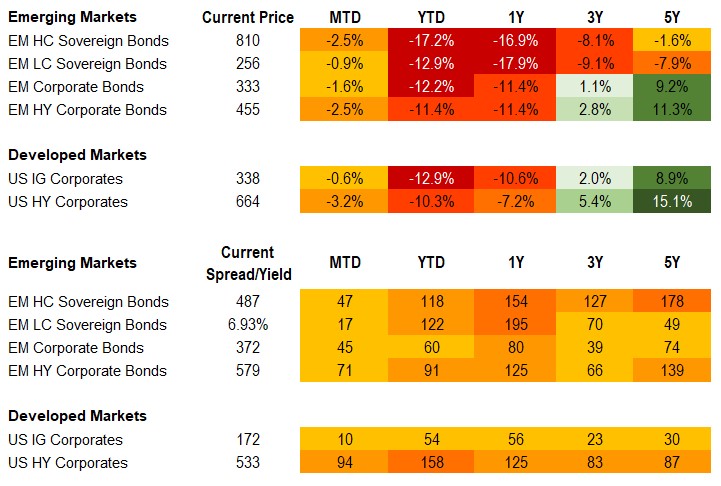
Equities
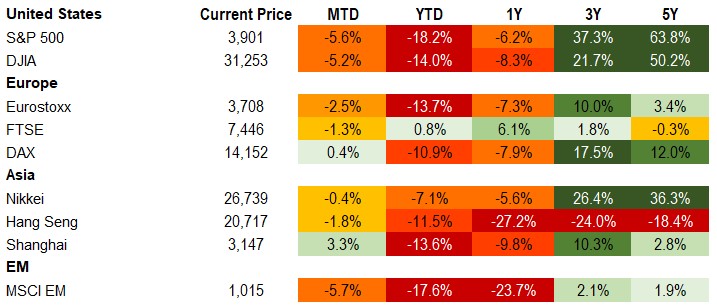
Commodities

Source for data tables: Bloomberg, JPMorgan, Gramercy. EM Fixed Income is represented by the following JPMorgan Indicies: EMBI Global, GBI-EM Global Diversified, CEMBI Broad Diversified and CEMBI Broad High Yield. DM Fixed Income is represented by the JPMorgan JULI Total Return Index and Domestic High Yield Index. Fixed Income, Equity and Commodity data is as of May 20, 2022 (mid-afternoon).
Emerging Markets Weekly Highlights
Weak China macro data continues to prompt downward growth revisions
Event: Worse than anticipated April retail sales (-11.1% y/y), industrial production (-2.9% y/y), and credit growth (10.3%) data combined with limited signs of deviation from zero COVID policy has driven the market consensus 2022 growth rate to 4.8% although still above the IMF’s 4.4% estimate. Notable downward revisions include DB to 3.3%, GS to 4%, and MS indicating data now pointing to their bear case of 3.5%.
Gramercy Commentary: While the current weakness lowers full-year expectations to between 3.5-4.5%, we expect a moderate pick-up from here as this virus wave subsides and the infrastructure push gains momentum. Depending on the scale of slowing external demand combined with a still constrained property sector and unaltered COVID strategy, pressure on net exports and consumption may require additional policy adjustment, particularly on the fiscal side.
Egypt exceeds hike expectations; Ghana stays the course on fiscal in 1Q
Event: Following April’s hot inflation print of 13.1%, the Bank of Egypt hiked its deposit rate by a greater than anticipated 200 bps to 11.25% (vs. 10.25% consensus). Meanwhile, Ghana’s first quarter fiscal results were generally in line with budget, yielding a fiscal balance of 7.6% of GDP (vs. 7.3% of GDP target) and reflecting that consolidation is underway with expenditures less than targeted to compensate for revenue underperformance.
Gramercy commentary: The incremental policy steps in both cases reflect continuation of the countries’ market friendly strategies to combat the ongoing shock. While neither development is enough to materially better the credit outlook in the backdrop of high external uncertainty, continued accumulation of such actions combined with clarity on external financing could improve the balance of risks, especially in the event of any signs of stabilization in the global backdrop.
Lebanon’s parliamentary elections failed to produce a political breakthrough for major economic reforms needed to unlock substantial foreign financial support
Event: In the May 15 elections, Hezbollah, the Iran-backed organization considered to be a terrorist group by the U.S., lost its legislative majority. The new parliament is likely to be highly fragmented and deeply divided over key issues in economic and foreign policy.
Gramercy commentary: Hezbollah’s dominance over Lebanese political life has been an important impediment to material financial support for Lebanon from key global and regional powers, despite the economic and social implosion over the last three years. From that perspective, the group losing its parliamentary majority at the expense of pro-Saudi and civil society forces could pave the way to improvements in some important international relationships. However, Hezbollah will remain the largest bloc in the new legislature and might have incentives to seek gridlock in order to preserve its interests. In the context of Lebanon’s notoriously complex government formation process, any additional political paralysis emerging from a more fragmented and polarized parliament does not bode well for economic reform prospects and ability to deliver on IMF conditionality for a potential bailout program by the Fund. The medium-term outlook for Lebanon’s battered economy will determine the ultimate shape and size of sovereign debt relief and the outlook for the sovereign Eurobonds. We are deeply skeptical that the post-election political environment can produce the bold economic actions needed to finalize an IMF program and unlock international financial aid, some of which has been frozen for years due to lack of progress on economic and political reforms. Overall, we are of the view that the parliamentary elections have not produced the structural political breakthrough that we think is necessary to trigger an inflection point in Lebanon’s economic and market trajectories.
Emerging Markets Technicals
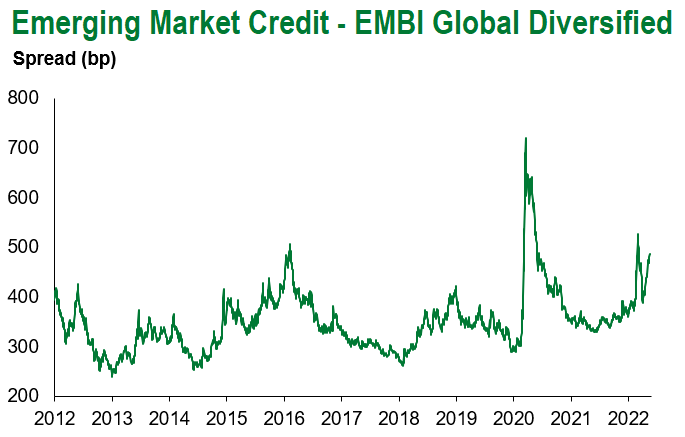
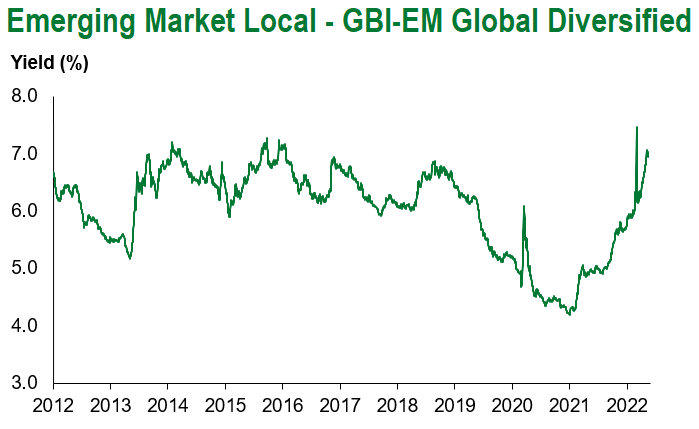
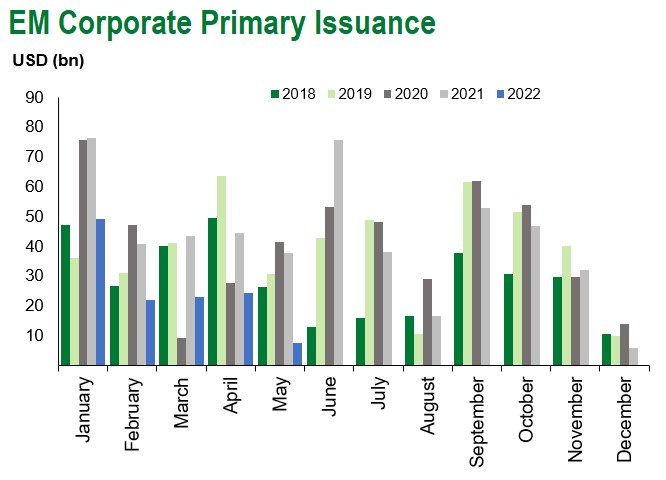
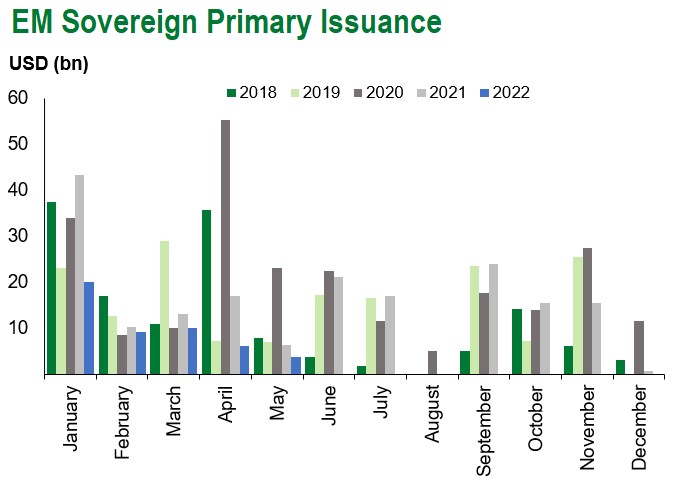
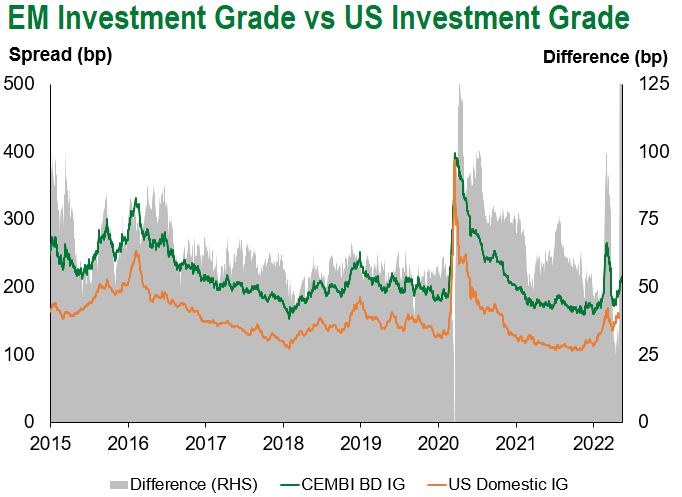
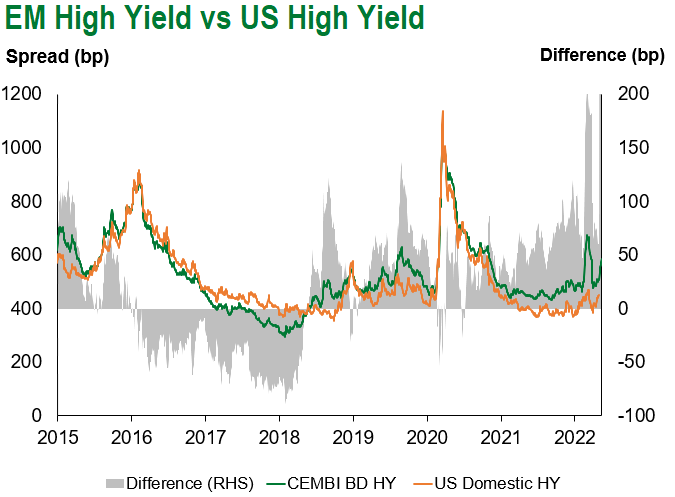
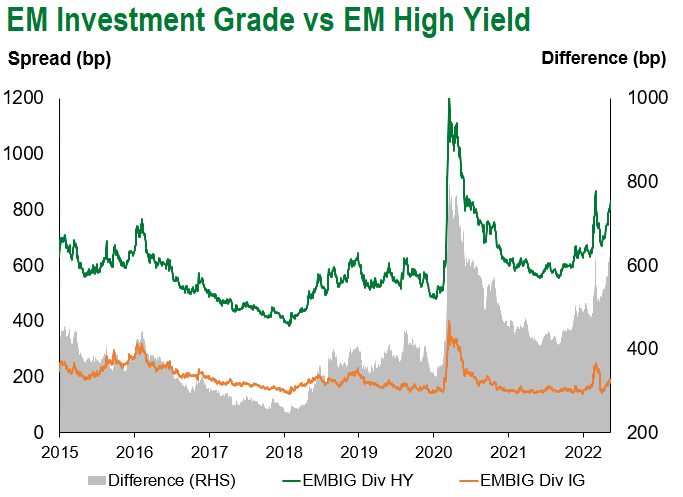
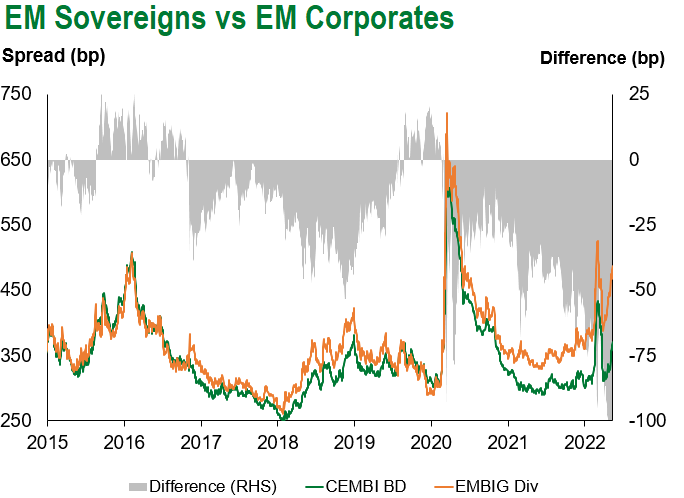
Emerging Markets Flows
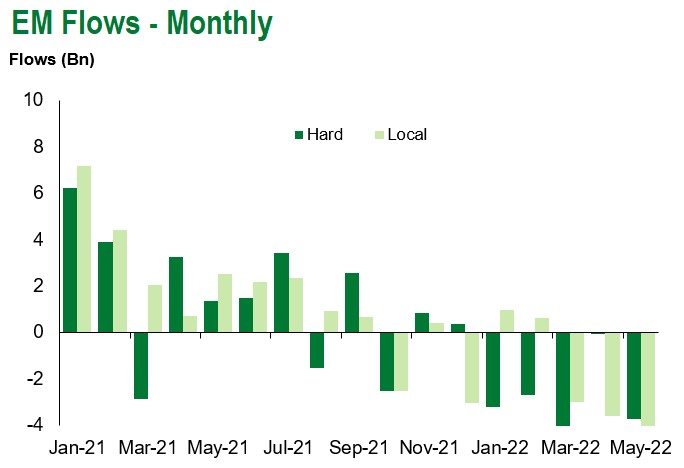
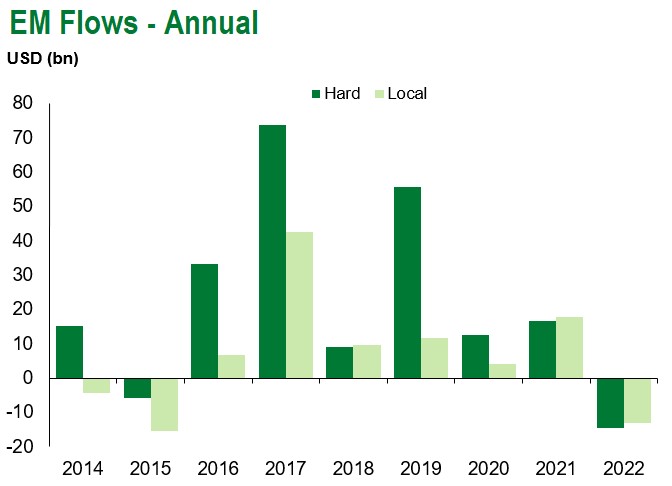
Source for graphs: Bloomberg, JPMorgan, Gramercy. As of May 20, 2022.
COVID Resources:
Johns Hopkins COVID-19 Case Tracker
For questions, please contact:
Kathryn Exum, CFA ESG, Director, Co-Head of Sovereign Research, [email protected]
Petar Atanasov, Director, Co-Head of Sovereign Research, [email protected]
James Barry, Director, Deputy Portfolio Manager, [email protected]
Tolu Alamutu, CFA, Director, Corporate Research Analyst, [email protected]
This document is for informational purposes only. The information presented is not intended to be relied upon as a forecast, research or investment advice, and is not a recommendation, offer or solicitation to buy or sell any securities or to adopt any investment strategy. Gramercy may have current investment positions in the securities or sovereigns mentioned above. The information and opinions contained in this paper are as of the date of initial publication, derived from proprietary and nonproprietary sources deemed by Gramercy to be reliable, are not necessarily all-inclusive and are not guaranteed as to accuracy. This paper may contain “forward-looking” information that is not purely historical in nature. Such information may include, among other things, projections and forecasts. There is no guarantee that any forecasts made will come to pass. Reliance upon information in this paper is at the sole discretion of the reader. You should not rely on this presentation as the basis upon which to make an investment decision. Investment involves risk. There can be no assurance that investment objectives will be achieved. Investors must be prepared to bear the risk of a total loss of their investment. These risks are often heightened for investments in emerging/developing markets or smaller capital markets. International investing involves risks, including risks related to foreign currency, limited liquidity, less government regulation, and the possibility of substantial volatility due to adverse political, economic or other developments. The information provided herein is neither tax nor legal advice. Investors should speak to their tax professional for specific information regarding their tax situation.